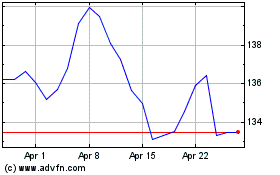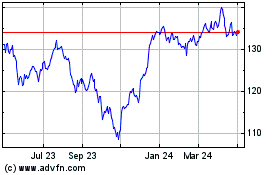By Deepa Seetharaman and Kirsten Grind
Facebook Inc. struck customized data-sharing deals with a select
group of companies, some of which had special access to user
records well after the point in 2015 that the social-media giant
has said it cut off all developers from that information, according
to court documents, company officials and people familiar with the
matter.
The unreported agreements, known internally as "whitelists,"
also allowed certain companies to access additional information
about a user's Facebook friends, the people familiar with the
matter said. That included information like phone numbers and a
metric called "friend link" that measured the degree of closeness
between users and others in their network, the people said.
The whitelist deals were struck with companies including Royal
Bank of Canada and Nissan Motor Co., who advertised on Facebook or
were valuable for other reasons, according to some of the people
familiar with the matter. They show that Facebook gave special data
access to a broader universe of companies than was previously
disclosed. They also raise further questions about who has access
to the data of billions of Facebook users and why they had access,
at a time when Congress is demanding the company be held
accountable for the flow of that data.
Many of these customized deals were separate from Facebook's
data-sharing partnerships with at least 60 device makers, which it
disclosed this week. Several lawmakers and regulators have
subsequently said those device-maker arrangements merit further
investigation.
Facebook officials said the company struck a small number of
deals with developers largely to improve the user experience, test
new features and allow certain partners to wind down previously
existing data-sharing projects. The company said it allowed a
"small number" of partners to access data about a user's friends
after the data was shut off to developers in 2015. Many of the
extensions lasted weeks and months, Facebook said. It isn't clear
when all of the deals ultimately expired or how many companies got
extensions.
The vast majority of developers who plugged into Facebook's
platform weren't aware that the company offered this preferred
access or extensions to certain partners, according to the people
familiar with the matter.
Ime Archibong, Facebook's vice president of product
partnerships, said in an interview Friday that the company
maintained a "consistent and principled approach to how we work
with developers over the course of the past 11 years."
He added that were some cases where the company worked "more
closely" with individual developers to test new features or when
winding down products. "But we have been extremely, I would say,
persistent and objective around how we worked with developers," Mr.
Archibong added.
Privacy experts said Facebook users likely didn't know how their
data was being shared. "I don't think anyone would have a
reasonable understanding of how widespread this was," said David
Vladeck, director of the Federal Trade Commission's Consumer
Protection Bureau from 2009 until 2013 and now a professor at
Georgetown Law.
Mr. Vladeck said any deals made after 2012 could draw scrutiny
about whether Facebook was in violation of its settlement that year
with the FTC, under which the firm is required to give the social
network's users clear and prominent notice and obtaining their
express consent before sharing their information beyond their
privacy settings. Facebook said Friday it hasn't violated the
settlement.
The revelations come as Facebook is dealing with the fallout in
March related to the use of personal data by Cambridge Analytica, a
political analytics firm that aided President Donald Trump's 2016
presidential campaign and purchased data on 87 million users from
another developer. The crisis sparked questions about Facebook's
lax oversight of its platform, an FTC investigation into whether
the company violated the 2012 settlement and two congressional
appearances by Facebook Chief Executive Mark Zuckerberg in
April.
In his testimony before Congress, Mr. Zuckerberg said Facebook
moved to eliminate broad access to information about users' friends
in 2014. Developers had until May 2015 to comply with the rules.
The move was a harsh blow to developers, forcing a number of apps
to shut down without access to the data. Others had to find
workaround solutions to continue operating.
On Friday, the company acknowledged that a subset of companies
were given extensions beyond May 2015.
"As we were winding down over the year, there was a small number
of companies that asked for short-term extensions, and that, we
worked through with them," Facebook's Mr. Archibong said. "But
other than that, things were shut down."
Facebook's relationships to outside developers have shifted over
time as it made key adjustments to how it shares data.
In 2007, the company started allowing developers to tap its
so-called social graph, including crucial information about a
user's friends. Unlike advertisers, developers didn't have to pay
for this information, giving rise to a new generation of startups
built on social connections.
This arrangement also made Facebook increasingly central to its
users' daily lives, despite objections from privacy groups and some
users about potential abuses of that data. By 2014, developers
could access about 30 different data points about users' friends,
including places they checked into, education history and religious
and political affiliation.
Early on, Facebook brokered special deals with certain
companies, some people with knowledge of the deals said.
"Ninety-nine percent of developers were treated the same, but 1%
got special treatment because they accounted for all the value of
the platform," one former Facebook employee said, referring to
popular apps and services that attracted users.
Eventually, Facebook set up internal teams dedicated to
brokering and developing customized data deals.
--Vipal Monga, Eliot Brown and Tripp Mickle contributed to this
article.
Write to Deepa Seetharaman at Deepa.Seetharaman@wsj.com and
Kirsten Grind at kirsten.grind@wsj.com
(END) Dow Jones Newswires
June 08, 2018 18:19 ET (22:19 GMT)
Copyright (c) 2018 Dow Jones & Company, Inc.
Royal Bank of Canada (TSX:RY)
Historical Stock Chart
From Mar 2024 to Apr 2024

Royal Bank of Canada (TSX:RY)
Historical Stock Chart
From Apr 2023 to Apr 2024
